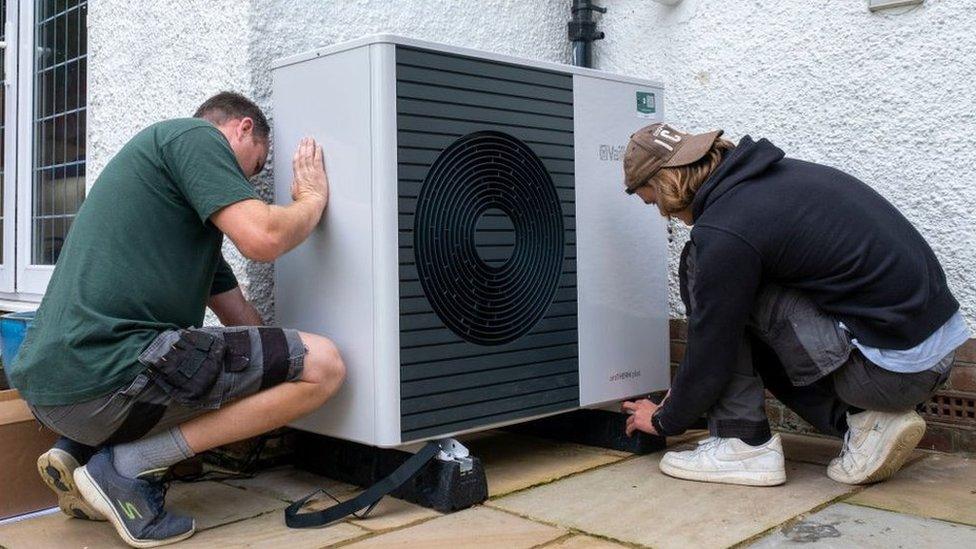Households across the UK may soon turn to boiler-heat pump hybrid systems as part of a government-backed strategy to decarbonise domestic heating and meet net-zero carbon emissions targets. The proposal, spearheaded by Energy Secretary Ed Miliband, is aimed at addressing cost barriers and practical challenges associated with full heat pump adoption.
Charting a Course for Smart Decarbonisation
An ambitious plan to decarbonise the UK housing sector aims to install 600,000 heat pumps per year by 2028. However, hybrid systems are being promoted due to concerns about their high upfront costs, space constraints, and compatibility with older housing stock.
Such systems offer a more flexible and cost-effective solution for many homes, combining gas boilers for backup during the colder months with heat pumps for daily use.
However, Hybrid systems are seen as a transitional solution, helping to reduce reliance on fossil fuels while avoiding the immediate financial strain of complete heat pump conversion. The technology provides both reliability and environmental benefits, adapting to varying energy demands across seasons.
How Hybrid Systems Work
Hybrid heating systems combine air-source heat pumps or ground-source heat pumps with conventional gas or hydrogen-ready boilers. This setup prioritizes efficiency, leveraging each component for its strengths:
- Heat pumps serve as the primary heat source, extracting renewable energy from the air or ground. They operate efficiently in mild to moderate conditions, offering a Coefficient of Performance (COP) of 3-4.
- During colder periods or peak demand, the gas boiler activates, delivering high-temperature heat and ensuring uninterrupted warmth.
The system’s smart controls seamlessly switch between the heat pump and boiler based on external temperature and energy efficiency, while zoning capabilities allow homeowners to manage heat distribution across different areas of the home.
Technical Details of Hybrid Boiler-Heat Pump Systems
Heat Pumps
- Types: Air-source and ground-source heat pumps, with typical output capacities ranging from 5-15 kW, depending on home size and insulation.
- Efficiency: Seasonal performance ratios (SCOP) exceeding 3.0, meaning three units of heat are produced per unit of electricity.
- Power requirements: Compatible with renewable electricity sources, improving carbon savings.
Boilers
- Backup heating: Modern condensing boilers or hydrogen-ready boilers complement the heat pump.
- Efficiency: Boilers achieve over 90% efficiency, minimizing fossil fuel reliance.
- Fuel options: Currently reliant on natural gas, but future-ready for biogas or hydrogen.
Control Systems
Smart thermostats and integrated controls optimize energy use by selecting the most efficient heat source. The systems ensure energy is not wasted and can adapt to user preferences and external conditions.
Environmental and Economic Impact
- Carbon savings: By reducing reliance on fossil fuels, households could cut CO₂ emissions by up to 60%.
- Energy efficiency: Hybrid systems balance renewable energy with reliability, significantly lowering energy bills.
Challenges and opportunities
Heat pump adoption has faced barriers, particularly in older homes with inadequate insulation or outdated heating infrastructure. Upgrades, such as larger radiators, underfloor heating, and improved insulation, may be necessary to maximize system performance. The high upfront cost remains a concern, but government-backed grants and incentives are being developed to make the transition more accessible.
Future integration of hydrogen fuel and battery storage offers additional potential for sustainability and energy independence, aligning with the UK’s long-term net-zero goals.
Environmental groups have praised the initiative as a practical step towards decarbonisation. However, some critics fear it could delay the full transition to renewable energy. The hybrid system’s reliance on gas may perpetuate fossil fuel use, even as renewable energy infrastructure expands.










Why not use UK’s fields to grow biomass to roll out HVO? This provides 90% reduction of emissions without changing oil boiler or system and keeps farmers and fields in work